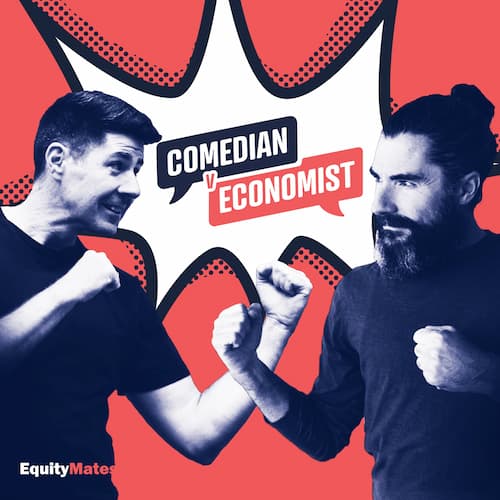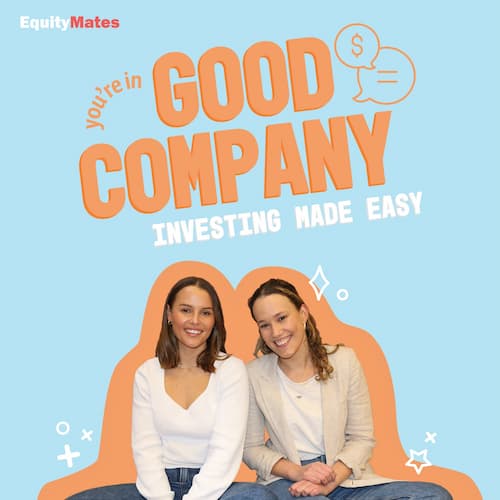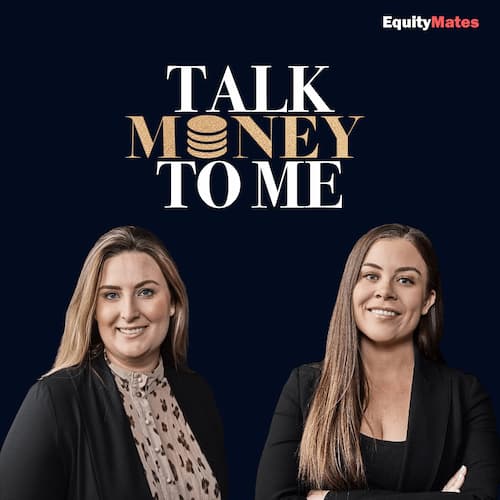- Equity Mates
- Posts
- 📈 CEOs are making millions trading competitors stock
📈 CEOs are making millions trading competitors stock
A collection of our favourite articles from the past week
Thought Starters

Looking for your next podcast? We’ve got you covered!
Over the past few years, we’ve been lucky to build Australia’s largest network of finance podcasts. And we love the fact that we get to work with a really talented group of podcast hosts. Between all of our shows, we cover a wide range of financial topics and interests. So whatever you want to learn or however you want to invest - Equity Mates Media has something for you.
But between 8 podcasts and more than 1,000 episodes released, it can be hard to know where to start.
So at the top of today’s Thought Starters email we thought we’d do something a little different and share a starting point for each podcast outside of the two that we host (Equity Mates and Get Started Investing). If you’ve been looking for your next podcast, here’s a few great episodes to get you started:

Wealthy executives make millions trading competitors’ stock with remarkable timing
ProPublica has produced some fantastic investigative journalism recently, including exposing ties between US Supreme Court Justice Clarence Thomas and billionaire Harlan Crow, which even saw Crow buying Thomas’ mother’s house. In the finance space, this ProPublica story caught our eye: CEOs of large American companies seem to be doing very well trading the stock of their biggest rivals.
Our first thought was that it seems wrong for CEOs to own shares in their biggest competitors. You don’t want the CEO of the company you own making millions if they lose a contract to their biggest rival. But this reporting for ProPublica shows some CEOs take it a step further. They are trading in and out of their competitors’ shares with remarkable timing.
There is the medical executive who made $2.3 million as a shareholder of their biggest rival and sold two days before that rival disclosed they were under investigation by the Securities and Exchange Commission. Or the oil executive that invested in a partner company one day before it announced good drilling results. Or a paper-industry executive that made 37% in less that a week by buying a competitor just before it announced an acquisition.
While these examples may feel like textbook cases of insider trading, ProPublica steps through the challenges of winning an insider trading case especially when an executive is trading the stock of a rival.
After reading this we’re going to propose something that shouldn’t be too controversial - CEOs of public companies should be banned from owning stock in their competitors outside of managed funds, indexes or ETFs. Even if it isn’t a rule, we’re surprised the Boards of these companies continue to allow it.
Inside Rupert Murdoch’s Succession Drama
Succession is back on TV and the Murdoch family are in court on two continents (we recently covered both Lachlan’s defamation case in Australia and Fox News’ defamation case in the US on The Dive). Add to that headlines about a recently broken engagement to a COVID-denying, “Qanon-style” radio host, and Rupert Murdoch is in the headlines. At 92 years old, many of those headlines are asking about succession planning for Fox Corporation and News Corporation.
This article from Vanity Fair has taken a look inside Rupert's inner circle to understand how the Murdoch family are managing succession planning. In summary, not well. The story of Rupert pitting the three children from his second marriage - Elisabeth, Lachlan and James - against each other is well told. For a decade James was the heir-apparent. Now, it looks like it is Lachlan.
Perhaps the more interesting story is not what Rupert thinks, but how whoever he picks will be controlled by their siblings. Control of Fox Corporation and News Corporation is managed through a Murdoch family trust, and a combination of James, Elisabeth and Prudence could constrain Lachlan.
It is fun to think about the parallels of the Roy family in Succession and the Murdoch family in real life. But the stakes here couldn’t be higher - the Murdoch empire has shaped democracies in the US, UK and Australia for decades and this family drama will determine how that power is wielded for decades to come. James and Lachlan, the two brothers with opposite political views, are now reportedly not speaking. So forget the idea of them working together. This story is only just getting started.
Octahedron Capital: A few things we learned (Q1 2023)
This quarterly presentation from Octahedron Capital is becoming a staple inclusion in Thought Starters. Every quarter Octahedron listen to all of the public company earnings calls and summarise what they learned for the sectors they’re investing in (digital advertising, gaming & content, payments & Fintech, eCommerce and software).
Before getting to the sectors they’re investing in, Octahedron summarise the macro commentary from a number of listed American companies. We can sum it up in two words: rising costs. As a result of these rising costs, as well as falling revenue and a slump in stock prices, many of these Q1 earnings calls were opportunities for companies to highlight their cost cutting programs. Octahedron has pulled out quotes from Meta and Alphabet as examples of this.
One interesting trend that Octahedron notes is the rise of advertising on eCommerce platforms. This has been a story playing out at Amazon for the past few years, but this quarter Mercado Libre, Uber and Delivery Hero all called it out in their earnings calls. So if you feel like you’re getting more push notification ads from Uber and more sponsored results on UberEATS, you are.
Octahedron’s quote of the quarter went to Microsoft’s CEO Satya Nadella who reminded those listening that they made Google “dance” by rushing out Google Bard.
If you are investing in individual companies or are just interested in where technology is going, this deck is full of insights. We find we always pick up a few great nuggets, so chances are you’ll be seeing it again when Octahedron produce it for Q2 in a few months.
Which will grow faster: India or Indonesia?
The International Monetary Fund have forecast that of the world’s 20 largest economies, India and Indonesia will be the fastest growing for 2023 and also over the next five years.
These two Asian economies are trying to grow in ways that are different to many emerging economies before them. As this article from The Economist writes:
For decades developing countries have followed a trusted formula for growing wealthier. Move workers from fields to more productive manufacturing jobs in cities, have them make goods for export, and watch the rapid formalisation of the economy. It worked in South Korea and Taiwan. In China it saw 800m people escape poverty. But today this scheme no longer works well.
Rather than focusing on manufacturing, Indonesia and India are focusing on different sectors of the economy. India has a strength in technology services, and currently accounts for 15% of the world’s IT services spending, which it wants to double down on. Indonesia, on the other hand, is blessed with natural resources critical to the global green energy transition, such as nickel. Estimates are that by 2030 it will be the world’s fourth-largest producer of “green commodities” and it hopes to build the economy by banning export of raw materials, forcing multinationals to process commodities onshore.
Both countries have grown quickly over the past decade and both are expected to continue growing in the coming years. This article from The Economist explores the similarities and differences between the two emerging economies to ultimately ask - which one will grow faster?
This article is thanks to GlobalX ETFs
Battery technology adoption and growth powers demand for lithium
For the past few years there has been no hotter sector in Australia than the lithium sector. Blessed with large reserves of lithium, Australia’s miners have been starting projects to try and satisfy the world’s demand.
This article from Global X is a great explainer on why lithium is such a valuable commodity in the green energy revolution. It is basically a 101 on everything you need to know about batteries.
So, if you’ve been hearing a lot about lithium, this article is a great one to help you understand why.
Thank you to eToro for sponsoring this email
eToro wants to remind Australian investors: don’t get clipped by commission.
Over time, small differences in brokerage cost can add up to big differences in the value of your portfolio. Which is why eToro offers Australian investors 0% commission on ASX shares.
Don’t believe us? We’ve done the maths. If you invested $100 a week for 40 years and earned the stock market’s long term average of 8% a year, you would have $1.5 million if you didn’t pay brokerage.
With $2 brokerage, you would miss out on $30,000
With $5 brokerage, you would miss out on $75,000
With $10 brokerage, you would miss out on $150,000
Small differences in brokerage add up over time.
When you’re choosing your brokerage platform, keep that in mind. And if you’re already signed up to a brokerage platform, check your fees. The great news is that you’re never locked in to one broker. So it pays (literally) to shop around and find the broker you’re happy with.
To learn more about eToro’s zero commission ASX offering, head to etoro.com/au
Disclaimer
All information contained at EquityMates.com and in any content produced by Equity Mates Media is for education and entertainment purposes only. Any advice is general advice only, and has not taken into account your personal financial circumstances, needs or objectives. It is not intended as a substitute for professional financial, legal or tax advice.
Before making any financial decisions you should read the Product Disclosure Statement (PDS) and, if you are unsure, consult a licensed financial professional.
Equity Mates Media operates under Australian Financial Services Licence 540697.
Equity Mates respects your privacy. All personal information collected is protected in line with Equity Mates' Privacy Policy.
Copyright © 2023 Equity Mates Investing Podcast, All rights reserved.








